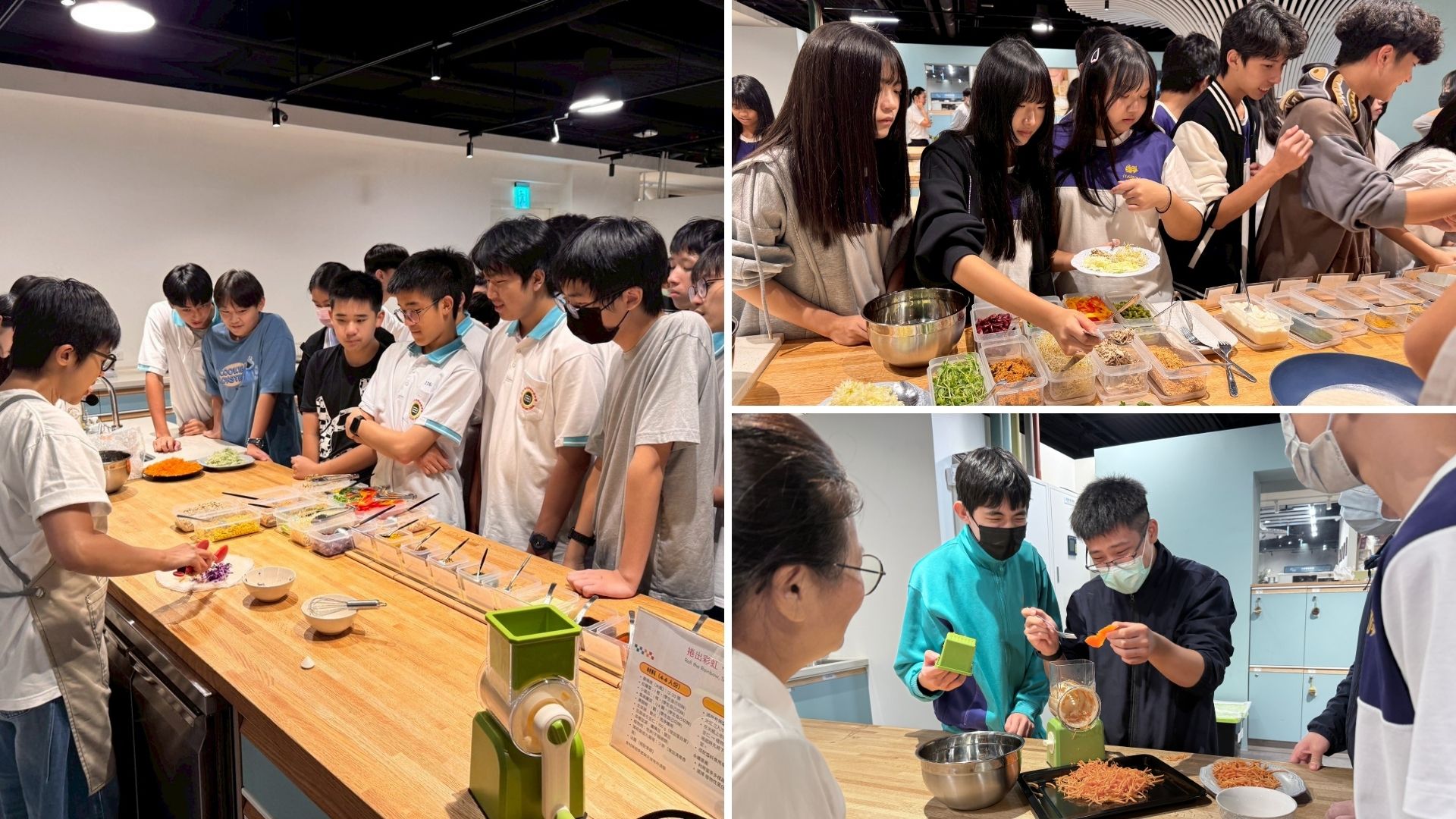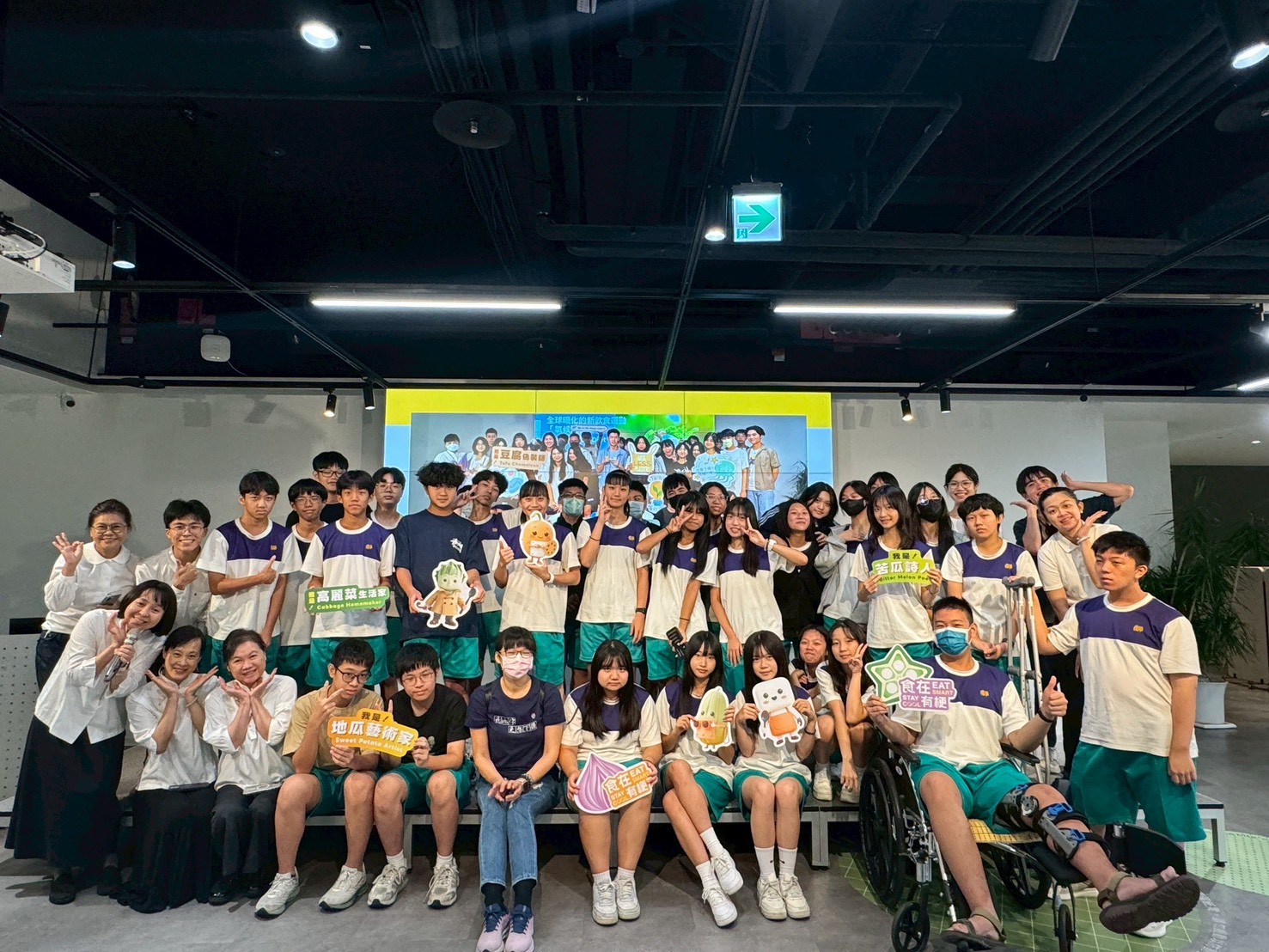As extreme weather events become increasingly common worldwide—record-breaking heatwaves in Mexico, accelerated ice melt in Antarctica, and Taiwan’s own rising frequency of severe climate incidents—our daily lives are constantly reminded of a simple truth: the Earth needs more changemakers.
To help the younger generation understand the close link between food choices and planetary sustainability, the Tzu Chi Foundation launched the Corporate Goodness Program, collaborating with businesses to promote plant-based education. Partnering with plantārium, the initiative opened its exhibition venue for guided tours, hands-on workshops, and reflective learning experiences—inviting students from various Taipei and New Taipei high schools to step into a real-world sustainable space and embark on a journey of sensory discovery and self-awareness.
A Plant-Based Meal: The First Step Toward Sustainability
The event began with a plant-based lunch, offering students nutritious dishes made entirely from plants. Yet, it was more than just a meal—it was an invitation to think deeply: “What am I eating?” and “What kind of world am I supporting through this choice?”
Each plant-based meal can reduce approximately 780 grams of CO₂ emissions, equivalent to the carbon footprint of a car traveling nearly 3 kilometers. This tangible data both surprised and inspired the students: their everyday choices truly have the power to lighten the planet’s load.
From that first bite, they began to see the connection between the dining table and the environment—realizing that what we eat is not only about taste, but also a conscious act of change.
Immersive Exhibition: From Food to Sustainability
Led by plantārium’s guides, students explored the themed exhibition “The Story of Food”, engaging with interactive displays that connected global climate issues to everyday eating habits. Through observation, listening, and discussion, they developed a more holistic understanding and sensitivity toward sustainability.
The exhibition featured five key learning themes:
What’s Happening to the Earth?
Starting with global climate anomalies, this section guided students to recognize that climate change is not a distant issue—it’s already reshaping our lives.
The Environmental Footprint of Animal Agriculture
Highlighting the vast water and land resources required for meat production, this section introduced plant-based eating as a direct and effective way to reduce carbon emissions.
Eat Local, Eat Seasonal
Through video storytelling, students learned the benefits of local and seasonal produce—from lowering cold-chain transportation emissions and supporting local farmers to reconnecting with the land.
Fun with Plant-Based Food
Showcasing creative and delicious plant-based dishes, this zone broke the stereotype of vegan food as “boring” or “limited,” inspiring fresh perspectives on plant-based living.
Food Waste and Regeneration: The Beauty of Imperfect Produce
The exhibition also spotlighted four innovative brands tackling the “ugly produce” issue, turning imperfect fruits and vegetables into meaningful, sustainable creations:
mooni
Collaborates with local markets and restaurants to recycle surplus produce and craft handmade natural soaps—eliminating single-use packaging through reusable containers.
Chuan Yong Orchard
Transforms sun-spotted fruits into vinegar and natural cleansers, reducing farmers’ losses while extending the lifespan of food.
Guo Yu
Uses low-temperature drying technology to create nutritious and flavorful dried fruits, giving “imperfect” fruits a second life.
MIZUIRO.INC (Japan)
Repurposes unmarketable produce into safe, non-toxic children’s crayons—infusing sustainability with design and education.
Hands-On Spring Roll Workshop: Learning with Heart and Hands

Plant-Based Research LabTo close the day, students made their own plant-based spring rolls, from ingredient selection to plating—learning not only about the diversity of plant ingredients but also about mindful cooking, food appreciation, and the value of sharing.
Through reflective worksheets and group sharing, students expressed heartfelt insights:
Huang, Yang Ming High School: “If each of us reduces just a little carbon, we can save many countries—including our own—and prevent more disasters.”
Cheng, Yang Ming High School: “Carbon emissions are the key factor driving the greenhouse effect!”
Liu, Cheng Yuan High School: “Buying local food can reduce transportation-related carbon output.”
Peng, Cheng Yuan High School: “Fifteen plant-based meals can plant a tree for the Earth.”
These reflections quietly sowed the seeds of awareness and willingness to act within the students’ hearts.
Small Choices, Great Love: Plant-Based Living for a Healthier Planet
When plant-based eating is no longer seen merely as a diet trend, but as an experience connecting climate, land, agriculture, and lifestyle values, young people begin to sense their role in shaping a better world.
This plant-based education initiative under the Corporate Goodness Program reminds us that every choice matters—each meal can be a gentle promise to the planet.
Support plant-based living. Support education. Support the next generation’s choices.
Because every meal can be a small act of kindness—for the Earth, and for the future.

